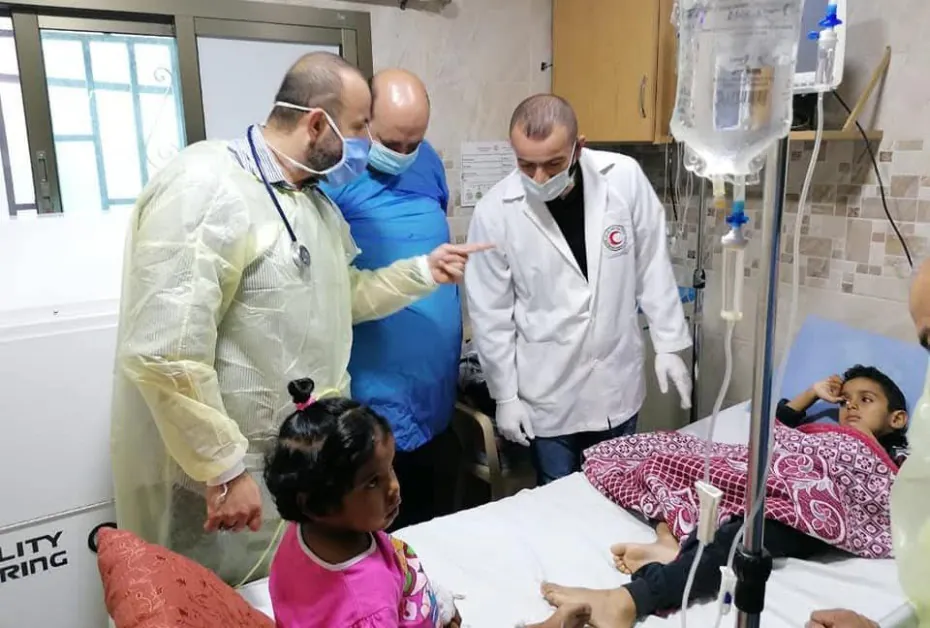Healthcare
AI Scribes Arrive in Lebanon: How Rhazes AI Is Redefining Frontline Healthcare

In the heart of southern Lebanon, where resources are stretched thin and patients often outnumber beds, a quiet transformation is underway. At Al Hamshari Hospital—serving tens of thousands of displaced Palestinian refugees—doctors are receiving support from a new kind of colleague: an artificial intelligence clinical scribe.
A First-of-Its-Kind Deployment
UK-Qatar healthtech startup Rhazes AI has launched a pilot project at Al Hamshari Hospital, marking the first structured deployment of AI scribes in a conflict zone. The hospital, operated by the Palestine Red Crescent Society, sits near Ein el-Hilweh, Lebanon’s largest Palestinian refugee camp, and is one of the few facilities offering dialysis and surgical services for southern camps. With just 80 beds, 56 doctors, and 31 nurses, it serves more than 4,000 patients every month—often performing hundreds of surgeries in times of crisis.
The conflict in Gaza and southern Lebanon has only intensified demand, with rising casualties and tens of thousands displaced. Doctors here see up to 60 patients in a single day, juggling multiple roles—generalist, specialist, and emergency physician all at once. The burden of documentation alone can consume hours, taking precious time away from patient care.
Now, with the support of Rhazes AI, Al Hamshari’s clinicians have access to an AI assistant capable of transcribing consultations in real time, aiding diagnostic reasoning, and producing structured medical records instantly. The pilot, running from August to November 2025, will measure its impact on documentation time, physician confidence, and patient flow.
How AI Scribes Work
At their core, AI scribes are digital assistants built to listen, learn, and document the doctor–patient encounter. Unlike conventional dictation tools, they do more than capture words. Rhazes AI’s platform transcribes consultations in real time, organizes information into structured medical notes, and suggests next steps based on clinical guidelines.
Key functions include:
- Real-time transcription of consultations, with context-aware structuring.
- Decision support, such as differential diagnoses and evidence-based treatment options.
- Automated documentation across the care continuum—admission notes, discharge summaries, referrals, and billing codes.
- Integration with hospital systems, allowing data to flow seamlessly into electronic patient records without requiring advanced infrastructure.
This level of support reduces administrative time dramatically—previous studies showed reductions of more than 60%—while minimizing the risk of missed details in chaotic, high-pressure environments.
Crucially, Rhazes emphasizes that AI scribes are not designed to replace doctors. They exist to amplify human expertise, handling repetitive tasks and offering guidance so that physicians can focus on what truly matters: their patients.
Voices from the Frontline
Dr. Zaid Al-Fagih, co-founder and CEO of Rhazes AI, explained the motivation behind the pilot:
“This collaboration is about bringing tools usually reserved for high-tech, high-resource hospitals into the hands of clinicians working on the frontlines. Advanced tools don’t need to wait for perfect conditions, they, and should, start where the need is greatest.”
He underscored that the goal is not replacement, but reinforcement:
“This isn’t about replacing doctors, it’s about surrounding them with support. When a young doctor is trying to manage dozens of complex cases a day, every second counts. Whether it’s transcribing an admission, accessing specialist-level knowledge or double-checking a differential diagnosis, Rhazes AI is there to reduce uncertainty and let doctors focus on what matters the most, the patients.”
Dr. Al-Fagih also highlighted the broader equity dimension:
“In an age where AI too often deepens inequality, this is an example of what it looks like to close that gap. It’s time for innovation to meet people where they are.”
For Rola Soboh, a Rhazes AI associate implementing the pilot, the project has deep personal significance:
“I have supported multiple research and humanitarian projects focused on refugee health and wellbeing in Lebanon, and this project is deeply personal. This hospital isn’t just a building, it’s a lifeline. Doctors here don’t just treat patients, they carry entire communities. So, when we talk about easing their load, it’s not just administrative, it’s emotional, physical, everything. To see cutting-edge technology actually serve people like this, in a place that’s so often forgotten, gives me a sense of real hope.”
Why This Matters
This deployment is more than just a pilot program—it is a test case for whether AI can truly democratize healthcare. In wealthy hospitals, AI scribes are already proving their worth. But in conflict zones, where health systems are under siege, the potential impact is magnified. Every reduction in paperwork, every second saved, translates directly into more patients seen, more conditions treated, and more lives saved.
The decision to introduce AI in a setting like Al Hamshari Hospital challenges the common assumption that advanced technology belongs only in high-resource environments. It demonstrates that AI can adapt to fragile systems, not just flourish in optimized ones.
A Vision for the Future
What Rhazes AI is piloting in Lebanon could be the beginning of a global shift. If AI scribes can succeed in a hospital operating under constant strain, then they can succeed anywhere—from refugee camps and rural clinics to overstretched urban emergency departments.
This points to a larger future: one where software becomes as essential to frontline healthcare as stethoscopes and syringes. A future where clinicians in war zones, disaster-stricken areas, or underserved regions are not left behind in the AI revolution.
The vision is bold: AI assistants that scale seamlessly across borders, helping clinicians document, decide, and deliver care with speed and confidence—even when infrastructure has crumbled. By lowering the administrative barriers that exhaust doctors, such systems can strengthen resilience in healthcare at a time when global crises are multiplying.
The Al Hamshari pilot may be modest in scope, but its symbolism is immense. It shows what is possible when innovation does not wait for perfect conditions, but instead runs toward the greatest need. In the words of its creators, AI can and should “meet people where they are.” If that principle guides future development, then AI scribes may one day become the unseen backbone of healthcare worldwide—empowering doctors, protecting communities, and delivering hope in the places that need it most.












